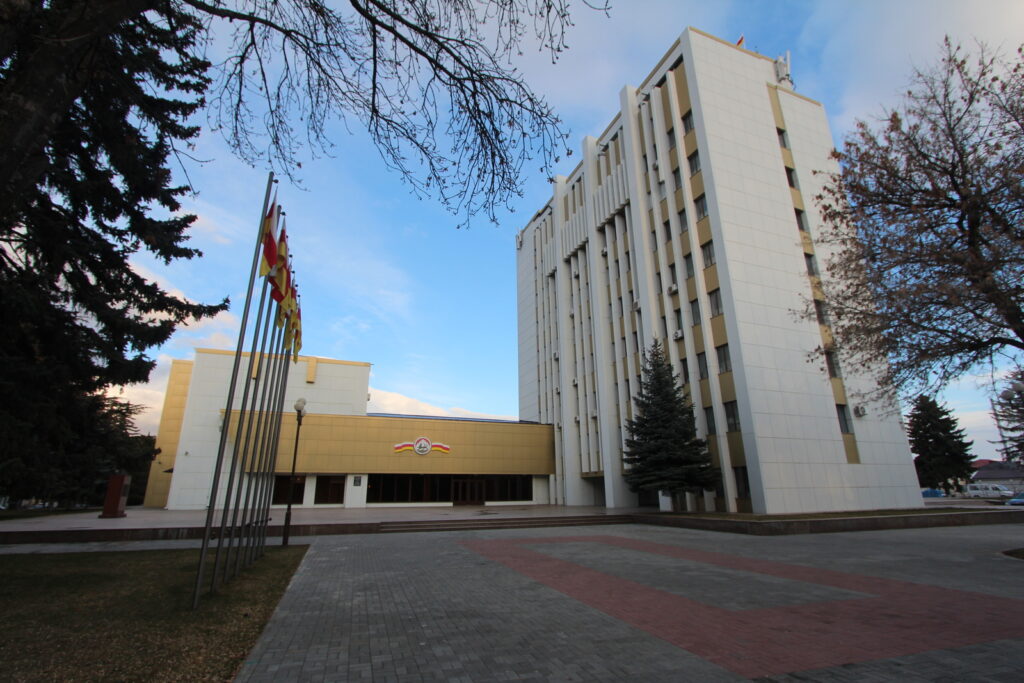A new government has begun to be sworn in in South Ossetia bringing an end to over six months of crisis.
On 12 March, opposition MPs ended their six-month boycott of parliament, approving Gennady Bekoev as prime minister.
On Tuesday, President Anatoly Bibilov signed a decree appointing nine ministers, eight of whom retained their previous posts.
The ministers of health and the interior, as well as the head of the Information and Press Committee, remain vacant, suggesting new faces could be appointed to the positions.
Former Interior Minister Igor Naniev was removed from office in August 2020, shortly after the death in custody of Inal Dzhabiyev. Dzhabiyev’s death was the spark for the months-long crisis which has included protests in the capital Tskhinval (Tskhinvali).

It came after the President announced a need for constitutional reforms in an interview with state TV channel Ir on 3 March.
South Ossetian political analyst Dina Alborova told OC Media it was not clear what President Bibilov meant by constitutional changes, but that changes were very much needed.
‘The political crises that constantly occur in our country speak of very deep-seated problems that lie in different areas, primarily in the field of law. The legal system needs to be changed’, Alborova said.
‘For me we are talking about a transition from a presidential form of government to a mixed — presidential-parliamentary one’, she said.
However, she said she feared the changes could include expanding the powers of the president, for example, by increasing term lengths from 5 to 7 years.
‘I could agree to such a change only if there was only one term, without the right to be re-elected again’, she added.
‘Each amendment has its pros and cons, and each amendment should be widely discussed and adopted separately. I have a lot of fears about how all this will happen.’
Alborova was sceptical of the new government’s ability to bring about changes.
‘I do not see people who could become engines of new progressive ideas for our society. I think there will be a couple of new faces to whom I wish success, but no matter how much they want to change something, I think that the old mass will overwhelm them.’
‘A responsive and sociable person’
Another appointment that attracted attention was the replacement of the head of Leningor (Akhaklgori), a district predominantly populated by ethnic Georgians.
Vitaly Mamitov, who previously held the position for two years, was replaced by the region’s deputy head, Vladimir Guliyev.
Tamara Mearakishvili, a local resident and prominent journalist and activist, welcomed this change.
‘Guliyev is well acquainted with the region, he comes from here, he is well known’, Mearakishvili told OC Media. ‘He is a responsive and sociable person.’
She said his appointment was also seen positively in the region as there had been reports he had told the president he would only agree to take the position if the border with Georgian-controlled territory was reopened.

‘I doubt very much that these rumors are true’, she said. ‘I do not believe that anyone put forward such conditions to the president, but people believe this, because their main problem is the road.’
Mearakishvili added that this was unlikely to happen until autumn, with president Bibilov hoping to increase his support in the region ahead of April 2022 presidential elections.
[Read more about Tamara Mearakshivli and her prosecution: Voice | Tamara Mearakishvili: 'If I'm found guilty, I will not run away']
Changes to government media strategy?
The three positions not yet filled are the Interiror Minister, Health Minister, and the head of the Information and Press Committee.
The position of Interiror Minister is currently occupied by Former Interior Minister Igor Naniev’s deputy, Merab Pukhaev, who faced criticism from for preventing Dzhabiyev’s family from errecting a tent in the city’s central square.
A source within the Ministry of Health told OC Media that the acting Health Minister, Georgy Totchiev, had long wished to step down. South Ossetia’s health authorities have faced public criticism over their inabilit to cope with the coronavirus outbreak in autumn.
The third position yet to be filled is that of the head of the State Committee for Information and Press. The Committee is the state media regulator and also runs state TV and radio and news agency RES .
Maria Kotayeva, who previously served as the committee’s head, has on several occasions disagreed with the approaches taken by the president’s PR specialists, suggesting this department could also see a change in its head.
There have been several changes to the government’s PR personnel in recent weeks, with perhaps the most significant being the departure of David Gazzati as an advisor to the president.
Gazzati stepped down shortly after giving an interview with Yulia Avidzba, the wife of Akhra Avidzba.
Akhra Avidzba, a former aide to Abkhazian President Aslan Bzhania, was arrested on 4 March and accused by the Abkhazian security services of planning to take part in a coup.
[Read more: Tense days in Abkhazia after arrest of former Bzhania aide]
Soslan Kokoev and Elina Marzoeva, a presidential media adviser and deputy spokesperson for the president, have also departed.
The government ministers to retain their seats were Defence Minister Ibragim Gasseev, Foreign Minister Dmitry Medoev, Education Minister Natalie Gassieva, Culture Minister Zhanna Zasseyeva, Minister of Civil Defence, Emergencies, and Disaster Relief Azamat Chochiev, Minister of Justice Zalina Lalieva, Minister of Construction, Architecture and Housing, and Communal Services Eduard Dzagoev, and Minister of Agriculture Alan Margiev.
Deputy Minister Dzambolat Tadtaev was appointed to the post of Minister of Economic Development, which was departed by the current Prime Minister Gennady Bekoev.
The primary geographic terms used in this article are those of the author’s. For ease of reading, we choose not to use qualifiers such as ‘de facto’, ‘unrecognised’, or ‘partially recognised’ when discussing institutions or political positions within Abkhazia, Nagorno-Karabakh, and South Ossetia. This does not imply a position on their status.




 20 March 2021
20 March 2021



